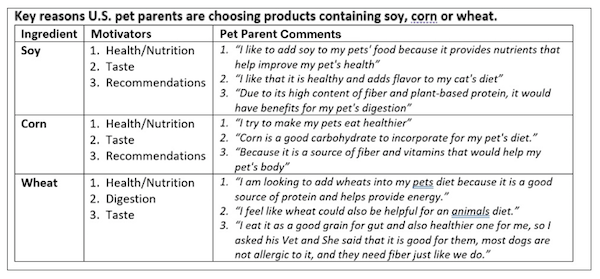The Pendulum Effect
For the last 3 decades marketing campaigns have “fed” pet owners messages that dogs and cats should not be fed soy, corn or wheat because these ingredients are unhealthy, cheap, non-nutritive fillers. Advertising from the 1990’s often unfairly disparaged these legacy ingredients with misinformation that was designed to create points of differentiation with competitive products. Today, the pendulum of public opinion is swinging back to a positive view of soy, corn and wheat for pets based on recent consumer research.
Three independent consumer surveys conducted by ADM revealed 80% of today’s U.S. pet owners are interested or open to soy, corn or wheat in their pet’s food and treats. While 20% of today’s pet owners are still avoiding these ingredients, they do not represent the majority of pet parents. This is welcomed news for pet food nutritionists and formulators who have long recognized the excellent nutritional and functional properties of these legacy ingredients for pets, foods and treats. This changing paradigm also provides more opportunities for manufacturers to develop pet products that mimic human foods and snacks due to the popularity and widespread use of these ingredients in the human food industry.

The survey results show 4 out of 5 pet parents are willing to purchase pet foods and treats containing soy, corn or wheat with certain products being more appealing than others. Today’s pet owners recognize the nutritional and health benefits these ingredients provide to their dogs and cats. The old misleading marketing messages that mischaracterized these legacy ingredients are no longer resonating with today’s pet parents.
In order to remain relevant with today’s pet owners, pet food manufacturers must recognize and respond to the desires of today’s pet parents as indicated in the ADM surveys. Pet food manufacturers who automatically dismiss soy, corn or wheat in their products will be missing a significant set of today’s pet owners. Failure to embrace this changing paradigm will find these manufacturers out of touch with more of today’s pet parents and future ones. [Link]
New study finds vegan diet dogs may live longer.
In an internet-based questionnaire, dog owners in North America who fed plant-based diets to their pets reported fewer health problems in their pets. In particular, the dogs’ owners reported

fewer disorders of the eye, gastrointestinal tract and liver in their dogs than owners of dogs fed conventional diets. Dog longevity was longer in the plant-based diet group’s responses. Likewise, those dog owners did not perceive adverse effects on their pets’ health from plant-based diets.
Scientists from the University of Guelph collected more than 1,400 questionnaires from dog owners across Canada and the US for the study, which has been published in the journal Research in Veterinary Science. It found that dogs on plant-based diets had a mean lifespan of 14.1 years, compared to a mean 12.6 years for those on meat-based diets.
As vegetarian and vegan diets become increasingly mainstream, pet owners want their companion animal’s diets to match their own edibility ethics. For dogs, which evolved to vacuum up human left-overs, this isn’t as much of a problem. Cats require more caution and additional research needs to continue to evaluate non-met options and general nutrition.
The British Veterinary Association, who has maintained a position against vegetarian diets for dogs and cats, are currently planning on re-evaluating their recommendations and encouraging additional research to be done to insure a balanced nutrition for our pets.
[Link] [Journal Article]
